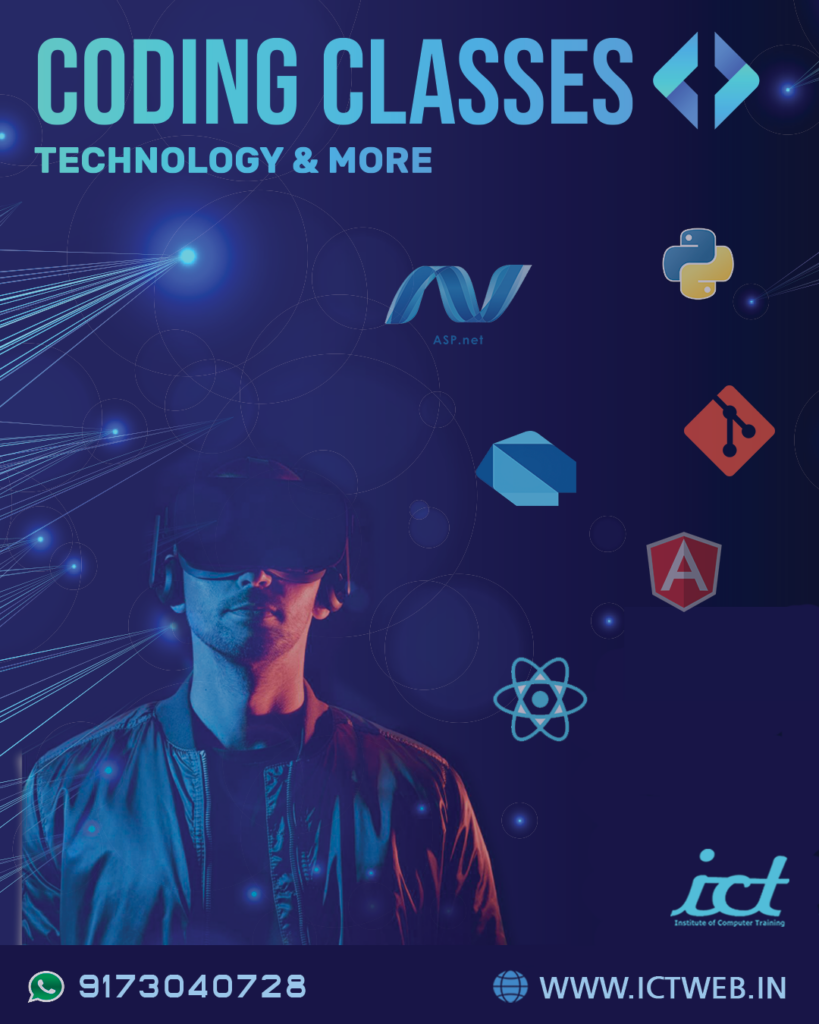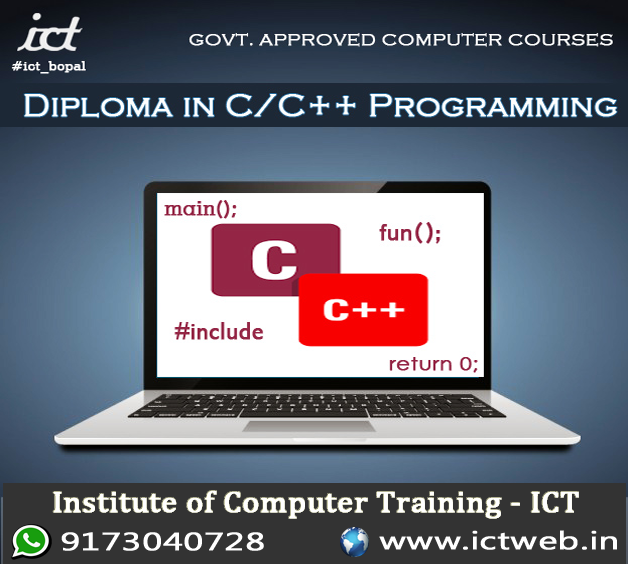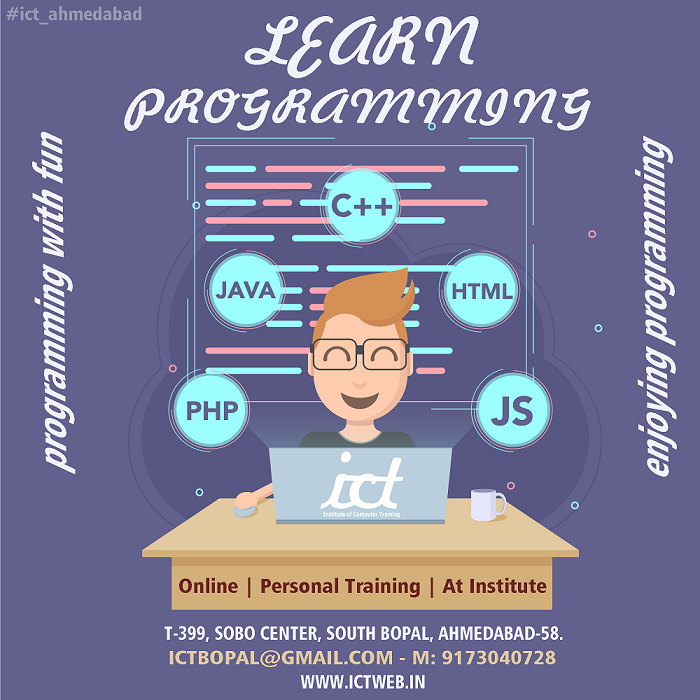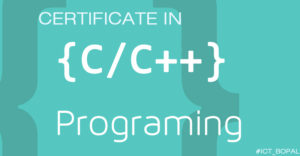C is a powerful general-purpose programming language. It can be used to develop software like operating systems, databases, compilers, and so on. It was created in the 1970s by Dennis Ritchie, and remains very widely used and influential. A computer program written in C is a human readable and ordered set of instructions that a computer executes.ICT Ahmedabad gives you best ‘C Language’ training from basic to advanced level, Our great programming exercise to develop logical things help you understand how a computer works, C programming offers fast compilation time to their users. In C, programs and codes get executed faster than any other languages. The primary applications of C programming language include operating system development, embedded systems, compilers and interpreters, database systems, game development, network programming, system utilities, and high-performance computing. The first significant use of the C language was to develop the Unix operating system. Today, almost all popular operating systems, such as Microsoft Windows, Linux, and even macOS, are based on Unix.Learn C Programming Language Course Training from ICT Skills India.
C Language Syllabus
Chapter 1. Fundamentals in C programming
Chapter 2. Operators and Expressions
Chapter 3. C Data types
Chapter 4. Input-Output Library Functions in C
Chapter 5. Equation and Control statements
Chapter 6. Loop in C
Chapter 7. Array in C Language
Chapter 8. String in C programming
Chapter 9. User-defined functions
Chapter 10. Pointer and Function
Chapter 11. Pointer and array in C
Chapter 12. Array and function
Chapter 13. Dynamic memory allocation
Chapter 14. Function Reference Calling
Chapter 15. String and function
Chapter 16. Command line arguments
Chapter 17. Preprocessor
Chapter 18. Structure in C
Chapter 19. Structure and function
Chapter 20. File Handling in C programming
C++ is an object-oriented programming OOP language which gives a clear structure to programs and allows code to be reused and reduced with lowering development costs. C++ is a powerful general-purpose programming language. ‘C++ programming language’ created by Danish computer scientist Bjarne Stroustrup in 1979. It can be used to develop operating systems, browsers, games, and so on.
ICT Ahmedabad provide the Best ‘C++ Language’ Course Training from basic to advanced level of object-oriented concept, We gives C++ course training in-depth knowledge about the OOP programming through practical examples and topic theoretical knowledge with industry best examples. C++ supports both procedural and object-oriented programming paradigms, offering features like classes, inheritance, and polymorphism. The C++ standard library provides a range of coding utilities and functions, making it easy to develop complex software systems. It’s
also utilized in databases, compilers, and applications requiring
high-speed execution like financial trading platforms and 3D.
Learn C++ Programming Language Course Training from ICT Skills India.
C++ Course Syllabus
1. Overview of C++
2. Basics of C++
3. Variables and Constants in C++
4. Data Types and Literals in C++
5. Operators in C++
6. Input/Output in C++
7. Control Statements in C++
8. Functions in C++
9. Pointers and References in C++
10. Arrays in C++
11. Strings in C++
12. Structures and Union in C++
13. Dynamic Memory Management in C++
14. Object-Oriented Programming in C++
15. Encapsulation and Abstraction in C++
16. Polymorphism in C++
17. Function Overloading in C++
18. Operator Overloading in C++
19. Inheritance in C++
20. Virtual Functions in C++
21. Exception Handling in C++
22. Files and Streams in C++

Here’s a comprehensive FAQ for a C language course:
1. What is the C programming language?
C is a high-level, general-purpose programming language that has been widely used for system and application software development. It was created in the early 1970s by Dennis Ritchie and is known for its efficiency, simplicity, and flexibility.
2. Who should take a C language course?
This course is ideal for:
- Beginners in programming who want to learn the fundamentals.
- Aspiring software developers or system programmers.
- Students pursuing computer science or related fields.
- Developers interested in learning low-level programming for systems, embedded, or performance-critical applications.
3. What prerequisites do I need to take this course?
For most introductory C courses, no prior programming experience is required. However, a basic understanding of computer operations or mathematics might be helpful. Some intermediate courses may require familiarity with basic programming concepts or other languages like Python or Java.
4. What topics are covered in a C language course?
A typical C programming course may include:
- Introduction to C: History, structure of a C program, basic syntax.
- Data Types and Variables: Primitive data types, constants, variables, and type conversions.
- Operators: Arithmetic, relational, logical, and bitwise operators.
- Control Structures: Conditional statements (if-else), loops (for, while, do-while).
- Functions: Declaration, definition, scope, parameters, and return values.
- Arrays and Strings: Handling arrays, multi-dimensional arrays, and strings.
- Pointers: Memory management, pointer arithmetic, dynamic memory allocation.
- Structures and Unions: Defining and using structures and unions.
- File I/O: Reading from and writing to files.
- Error Handling: Using standard error handling techniques.
- Recursion: Understanding and applying recursion.
- Memory Management: Using
malloc(),calloc(),free(), and memory leaks.
Advanced courses may cover topics like:
- Multi-threading.
- C libraries and data structures.
- Advanced algorithms.
- Optimizing performance and memory.
5. How long is the C language course?
The duration of the course varies based on the depth and format.
- Introductory courses may last from 6 to 8 weeks.
- Intermediate or advanced courses could extend to 8-12 weeks.
- We Provide C Language Online and Offline Training at Ahmedabad.
6. What materials or tools do I need for this course?
- A computer: To write and compile C code.
- Compiler/IDE: You will need a C compiler to execute your programs (e.g., GCC, Clang, or an IDE like Code::Blocks, DevC++, or Visual Studio Code).
- Text editor: Any text editor can be used, but some IDEs (like DevC++ or Code::Blocks) offer a more integrated environment.
- C programming books or online references (such as “The C Programming Language” by Brian Kernighan and Dennis Ritchie).
7. How can I practice what I’ve learned?
- Write programs: The best way to learn C is by writing and testing code.
- Solve problems: We provide C-specific coding challenges.
- Projects: Build small applications (e.g., a calculator, file manager) to practice core concepts.
8. Can I take this course if I already know another programming language?
Yes! Having prior programming experience (e.g., in Python or Java) can actually make learning C easier, as you’ll already be familiar with basic programming concepts. However, C’s syntax and memory management approach are quite different from many higher-level languages, so you’ll need to focus on these aspects.
9. Will I be able to write real-world applications after completing this course?
By the end of a beginner C course, you’ll be equipped to write small, functional programs. In intermediate and advanced courses, you’ll learn the skills to write more complex applications like command-line tools, file managers, and system programs. Mastery of C can also lead to development for embedded systems, operating systems, and performance-critical applications.
10. Is C still relevant in today’s software development?
Absolutely! C is foundational in modern computing. It is widely used in system programming, embedded systems, game development, real-time applications, and performance-sensitive tasks. Learning C provides a deep understanding of how computers work, especially memory management and hardware-level programming.
11. What can I do after learning C?
After completing a C course, you can:
- Work on low-level programming (drivers, embedded systems).
- Contribute to open-source projects that use C.
- Transition to other languages like C++, Rust, or Go.
- Pursue jobs in systems programming, software development, or embedded systems.
12. How can I get support during the course?
Support may come in the form of:
- Instructor-led sessions: For live Q&A.
- Discussion forums or online communities: Platforms like Stack Overflow, Reddit (r/C_Programming), or course-specific discussion boards.
- Study groups: Collaborating with fellow learners for better understanding.
If you’re new to programming or have experience with other languages, a C programming course will help you build a solid foundation in computer science and software development.
If any query regarding any programming language, Contact us – ICT Ahmedabad.
A programming language is a formal language, which comprises a set of instructions that produce various kinds of output. Programming languages are used in computer programming to implement algorithms.
Most programming languages consist of instructions for computers. There are programmable machines that use a set of specific instructions, rather than general programming language.
Operating Systems
Be it Microsoft Windows or Mac OSX or Linux – all of them are programmed in C++. C/C++ is the backbone of all the well-known operating systems owing to the fact that it is a strongly typed and a fast programming language which makes it an ideal choice for developing an operating system. Moreover, C is quite close to the assembly language which further helps in writing low-level operating system modules.Browsers
The rendering engines of various web browsers are programmed in C++ simply because if the speed that it offers. The rendering engines require faster execution to make sure that users don’t have to wait for the content to come up on the screen. As a result, such low-latency systems employ C++ as the programming language.Libraries
Many high-level libraries use C++ as the core programming language. For instance, several Machine Learning libraries use C++ in the backend because of its speed. Tensorflow, one of the most widely used Machine Learning libraries uses C++ as the backend programming language. Such libraries required high-performance computations because they involve multiplications of huge matrices for the purpose of training Machine Learning models. As a result, performance becomes critical. C++ comes to the rescue in such libraries.Graphics
All graphics applications require fast rendering and just like the case of web browsers, here also C++ helps in reducing the latency. Software that employ computer vision, digital image processing, high-end graphical processing – they all use C++ as the backend programming language. Even the popular games that are heavy on graphics use C++ as the primary programming language. The speed that C++ offers in such situations helps the developers in expanding the target audience because an optimized application can run even on low-end devices that do not have high computation power available.Banking Applications
One of the most popularly used core-banking system – Infosys Finacle uses C++ as one of the backend programming languages. Banking applications process millions of transactions on a daily basis and require high concurrency and low latency support. C++ automatically becomes the preferred choice in such applications owing to its speed and multithreading support that is made available through various Standard Template Libraries that come as a part of the C++ programming kit.Cloud/Distributed Systems
Large organizations that develop cloud storage systems and other distributed systems also use C++ because it connects very well with the hardware and is compatible with a lot of machines. Cloud storage systems use scalable file-systems that work close to the hardware. C++ becomes a preferred choice in such situations because it is close to the hardware and also the multithreading libraries in C++ provide high concurrency and load tolerance which is very much needed in such scenarios.Databases
Postgres and MySQL – two of the most widely used databases are written in C++ and C, the precursor to C++. These databases are used in almost all of the well-known applications that we all use in our day to day life – Quora, YouTube, etc.Embedded Systems
Various embedded systems like medical machines, smartwatches, etc. use C++ as the primary programming language because of the fact that C++ is closer to the hardware level as compared to other high-level programming languages.Telephone Switches
Because of the fact that it is one of the fastest programming languages, C++ is widely used in programming telephone switches, routers, and space probes.Compilers
The compilers of various programming languages use C and C++ as the backend programming language. This is because of the fact that both C and C++ are relatively lower level languages and are closer to the hardware and therefore are the ideal choice for such compilation systems.1) C++ is a kind of superset of C, most of C programs except few exceptions (See this and this) work in C++ as well.
2) C is a procedural programming language, but C++ supports both procedural and Object Oriented programming.
3) Since C++ supports object oriented programming, it supports features like function overloading, templates, inheritance, virtual functions, friend functions. These features are absent in C.
4) C++ supports exception handling at language level, in C exception handling is done in traditional if-else style.
5) C++ supports references, C doesn’t.
6) In C, scanf() and printf() are mainly used input/output. C++ mainly uses streams to perform input and output operations. cin is standard input stream and cout is standard output stream.
More information about C, C++ Visit ICT.
Best C and C++ Programming Training Classes in Ahmedabad
Here’s a list of common Frequently Asked Questions (FAQ) for a C++ language course:
1. What is C++?
- Answer: C++ is a high-level, general-purpose programming language created by Bjarne Stroustrup in 1979. It is an extension of the C programming language with object-oriented features like classes and objects. C++ is used for system/software development and applications requiring high-performance graphics, like game development.
2. Who should take this C++ course?
- Answer: This course is suitable for beginners who want to learn programming as well as intermediate programmers who want to enhance their understanding of C++. It is also ideal for those planning to pursue careers in game development, systems programming, or software engineering.
3. What will I learn in this course?
- Answer:
- Basic syntax and structure of C++ programs
- Variables, data types, and operators
- Control flow: if-else, loops, switch statements
- Functions, scope, and recursion
- Object-oriented programming (OOP) concepts: classes, objects, inheritance, polymorphism
- Memory management with pointers
- Basics of Standard Template Library (STL)
- File handling and basic algorithms
4. Do I need any prior programming knowledge to take this course?
- Answer: No prior programming experience is required for this course. It is designed to teach C++ from the basics, though familiarity with programming concepts or another language like Python or Java may make learning faster.
5. What tools do I need for this course?
- Answer:
- A C++ compiler such as GCC (GNU Compiler Collection) or Clang
- An Integrated Development Environment (IDE) like Visual Studio, Code::Blocks, or CLion
- Alternatively, you can use an online compiler like Replit or Compiler Explorer.
6. What is the duration of the course?
- Answer: The course duration typically ranges from a few weeks (for beginner-level courses) to several months (for more advanced, comprehensive programs). It depends on the depth and format of the course. Visit our Institute(ICT Ahmedabad) for more information of C Plus Plus programming language.
7. How is the course structured?
- Answer:
- Lectures: In-depth explanations of C++ concepts and techniques
- Practice exercises: Hands-on coding exercises to reinforce learning
- Quizzes and tests: To assess your understanding of key concepts
- Projects: Practical projects or assignments to apply your knowledge
8. Will I be able to write C++ programs after completing this course?
- Answer: Yes, by the end of the course, you should be able to write, debug, and optimize simple C++ programs. You will also have the foundation to tackle more advanced programming tasks.
9. Is C++ still relevant in the job market?
- Answer: Absolutely. C++ remains one of the most widely used languages, especially in performance-critical applications such as game development, system programming, embedded systems, and high-frequency trading. Many tech companies look for developers with C++ skills.
10. Are there any prerequisites for learning C++?
- Answer: No specific prerequisites are needed for beginners, though some basic understanding of mathematics (e.g., logic and simple algebra) might help. For those with prior programming experience, it will be easier to pick up.
11. What is the difference between C and C++?
- Answer:
- C is a procedural language, whereas C++ is an object-oriented language that supports both procedural and object-oriented programming paradigms.
- C++ has features like classes, inheritance, and polymorphism that are absent in C, along with advanced data structures and algorithms.
12. What are some common mistakes beginners make in C++?
- Answer:
- Not understanding memory management (e.g., using uninitialized pointers or memory leaks)
- Misunderstanding object-oriented concepts like inheritance and polymorphism
- Incorrect use of operators (e.g., assignment vs. comparison)
- Lack of understanding of scope and variable lifetime
- Not handling exceptions properly
13. What are some common projects to practice C++?
- Answer:
- Tic-Tac-Toe or Sudoku games
- Bank account management system
- Student database management system
- Simple text-based RPG
- File handling and text processing programs



